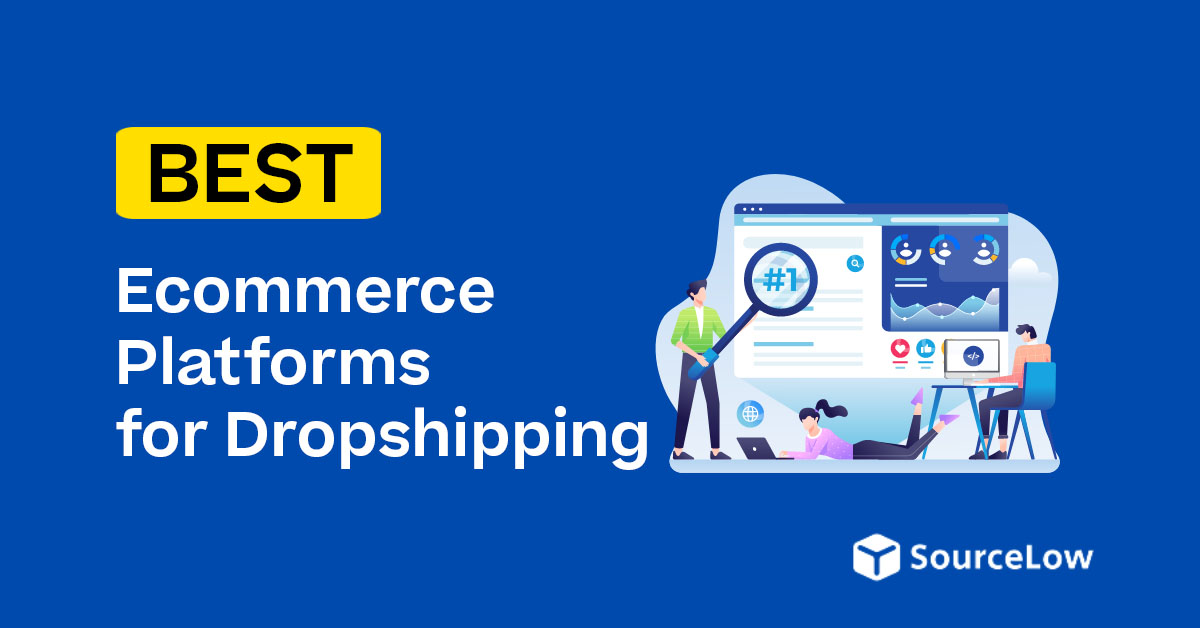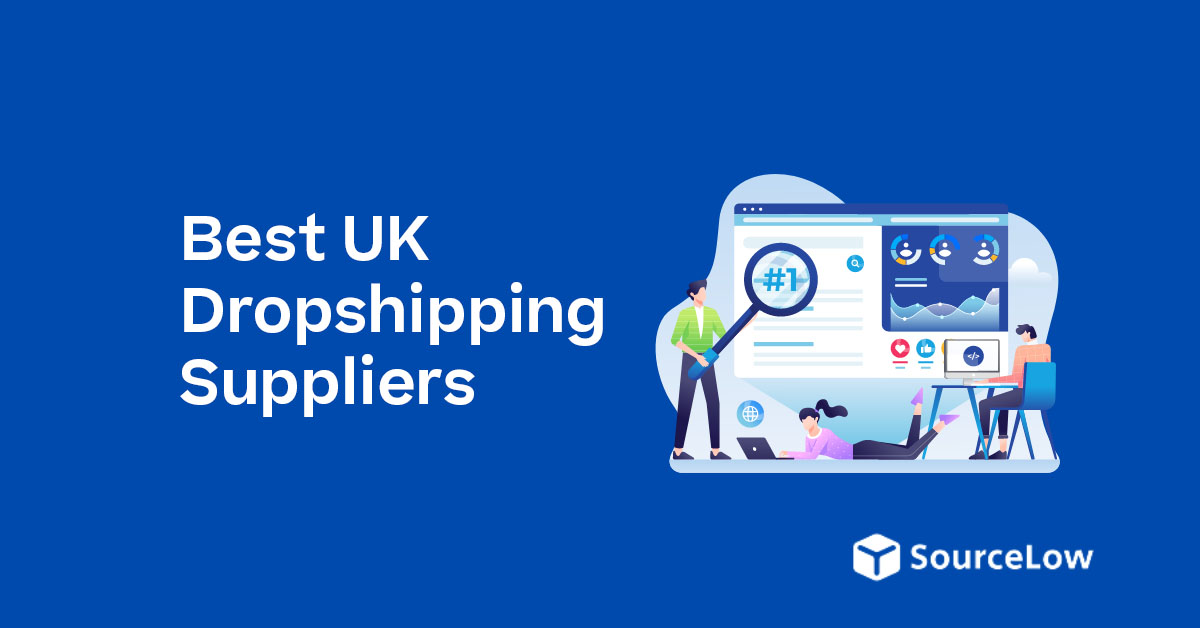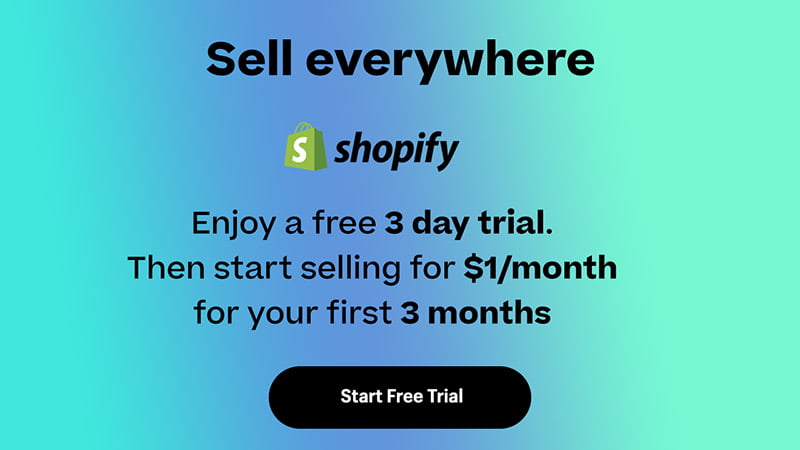Disclosure: We may earn a commission or fee from some of the links in our content. However, this does not affect our recommendations. Learn more.
If you’re looking for the best ecommerce platforms for dropshipping, you’re not alone.
As the ecommerce market has exploded in the last few years, demand for dropshipping has grown alongside it. Now, the global market for dropshipping is expected to reach a value of $1862.64 billion by 2032, growing at a CAGR of 25%.
But creating a successful dropshipping business requires more than sourcing high quality products from the right suppliers. You also need a platform you can use for selling. Ecommerce platforms allow you to build your own online store and checkout experience, with complete control over your brand, as well as sales and marketing methods.
The question is, which ecommerce platform should you use?
We’ve reviewed some of the top options, from tools for beginners, to advanced SaaS solutions, to bring you this complete guide.
Best Ecommerce Platforms for Dropshipping
Why You can Trust SourceLow
At SourceLow, we’re committed to supporting ecommerce and dropshipping business leaders with the best resources on the web to help them start and grow their business. We’ve conducted comprehensive hands-on reviews of all the ecommerce store builders mentioned below, to ensure we can provide behind-the-scenes insights into why they might be right for you.
What is Dropshipping?
Dropshipping is a popular order fulfillment option and business model which allows ecommerce retailers to outsource the process of procuring, storing, and shipping products to consumers.
With dropshipping, you don’t create or hold inventory yourself. Instead, you find a supplier who can provide the products you want, and list those items on your store.
Whenever a customer places an order for a product, their details are sent to your dropshipping suppliers. They pick, package, and ship the order to your customer for you, and charge you for the base cost of the item and shipping, meaning you keep the profits from the sale.
Dropshippers benefit from a very straightforward and low-risk business model. There are no inventory costs to worry about, and you don’t have to handle items directly. Plus, with access to integrations, companies can leverage automation, to streamline the order processing process.
What to Look for in an Ecommerce Platform for Dropshipping
There are many ways for entrepreneurs to start a dropshipping store. You can sell on existing marketplaces like Amazon, Etsy, or Ebay, or even through social media channels.
However, launching your own store with an ecommerce platform gives you a lot more control.
It ensures you can create the perfect user-friendly experience for your audience, take advantage of marketing strategies like SEO and content production to scale your store, and build a memorable brand.
While many ecommerce website builders will support dropshipping startups, there are a few things that you should looking for in the right platform:
- Excellent design tools: The best ecommerce platform should always make it simple to create an attractive and user-friendly store. Look for a solution with plenty of attractive and mobile responsive templates, and an intuitive drag-and-drop website builder.
- Dropshipping integrations: Integrations and dropshipping apps make running your dropshipping business much simpler. They help you to import products, process orders, and manage fulfillment instantly. Look for a platform with plenty of add-ons for dropshipping directories, fulfillment companies, and print-on-demand vendors.
- Ease of use: Whether you choose a hosted platform or open-source platform for ecommerce, it should always be easy to use. The right ecommerce platform will come with an intuitive backend, plenty of guides to get you started, and convenient features.
- Built-in marketing tools: Marketing tools built into your ecommerce platform make it easier to run campaigns that attract customers to your store. You might look for solutions with their own email marketing or social media marketing tools. Or you make look for a website builder with integrated SEO features, and a blog for content marketing.
- Affordability: The price of your ecommerce solution can vary depending on your needs. Make sure you look for something that matches your budget. Think about the price you’ll pay for monthly subscriptions, hosting, domain names, and transaction fees.
- Business management tools: Ensure you have all the features you need to run your online business built into your ecommerce platform. This includes inventory management and order management tools, payment gateways, and even customer relationship management options.
The 8 Best Ecommerce Platforms for Dropshipping
To create this list of the top ecommerce platforms for dropshipping, we conducted in-depth and firsthand reviews of dozens of reputable platforms, looking at all of the components mentioned above. We also examined the overall reputation of each platform, based on reviews from other customers on channels like G2 and TrustPilot.
1. Shopify
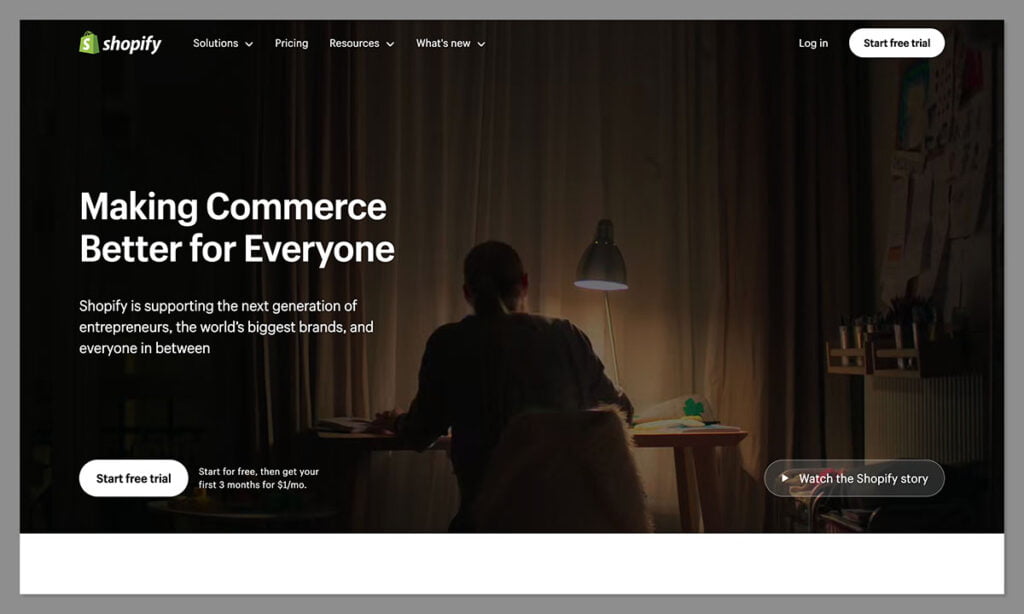
Shopify is our number one choice for the best ecommerce platform for dropshipping. It’s one of the biggest, and most lucrative platforms around, supporting millions of vendors across 170 countries.
Not only is an extremely reliable platform, but Shopify is also highly versatile.
With an account, dropshippers can sell on their own Shopify store, as well as across other marketplace and social media channels.
You can sell products worldwide, with payment processing for multiple currencies, and manage everything in a unified backend. Plus, you can create an incredible brand, with plenty of amazing themes, and design tools.
Shopify Key Features:
- Support for selling unlimited products (of any type)
- Omnichannel and international sales tools
- In-depth analytics and reporting
- Search engine optimization and marketing tools
- Business management, shipping, and fulfillment tools
- End-to-end automation and AI features
- Intuitive themes and website design tools
Shopify Dropshipping Integrations
Shopify’s massive app market is one of the main reasons we recommend this platform for dropshippers. It offers access to all of the top dropshipping and POD apps, from DSers (AliExpress), to AutoDS, Zendrop, CJDropshipping, Printful, and many others.
Pricing:
You can start using Shopify for free for three days. There’s also a Starter plan for $5 per month for people selling through social media and messaging apps. Comprehensive plans start at $39 per month, and range up to $2000+ per month for Shopify Plus. Notably, all Shopify plans do come with transaction fees to consider.
Pros:
- Huge app store with hundreds of dropshipping plugins
- Easy to use environment for beginners
- Highly scalable with omnichannel and international sales
- Excellent business management tools
- Marketing features and SEO built-in
Cons:
- Transaction fees on all plans
- Limited checkout customization
2. Wix
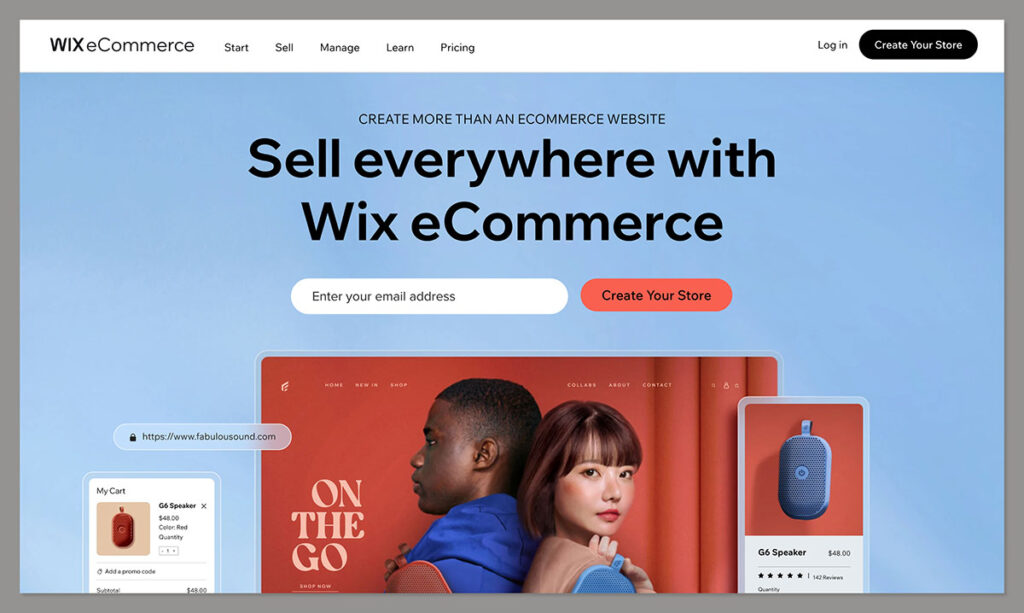
Combining simplicity with flexibility, Wix is one of the most popular website builders in the world. It’s drag-and-drop interface, AI website design tools, and intuitive themes make it a great choice for beginners with limited coding knowledge.
Plus, Wix makes it easy to create a compelling brand, with logo building tools and responsive themes.
Wix is packed with useful features for business owners, from reporting and analytical tools, to automated workflows, SEO solutions and more. You can manage and sync your inventory across multiple channels in one place, and access abandoned cart recovery tools on cheaper plans.
Wix Key Features:
- Multiple payment processing options for various currencies
- Omnichannel sale options for marketplaces and social media
- Extensive automation and AI tools
- SEO and marketing tools
- Excellent website templates and drag-and-drop builder
- Advanced web and mobile app development
Wix dropshipping integrations
The Wix app market is home to dozens of dropshipping apps, including popular options like AutoDS, Spocket, Modalyst, Syncee, Doba, Avasam, and Printful for print on demand.
Pricing
Wix offers a range of pricing plans for businesses of all sizes, however, there are only three plans that support ecommerce and payment processing. Prices start at $27 per month for the “Core” plan, and range up to $159 per month, with no transaction fees.
Pros:
- User-friendly interface with AI design tools
- Attractive templates and themes
- Built-in SEO and marketing tools
- Automatic inventory updates and syncing
- Support for selling various kinds of products
Cons:
- Limited scalability for high-volume stores
- Difficult to switch between templates after you choose one
3. Square Online
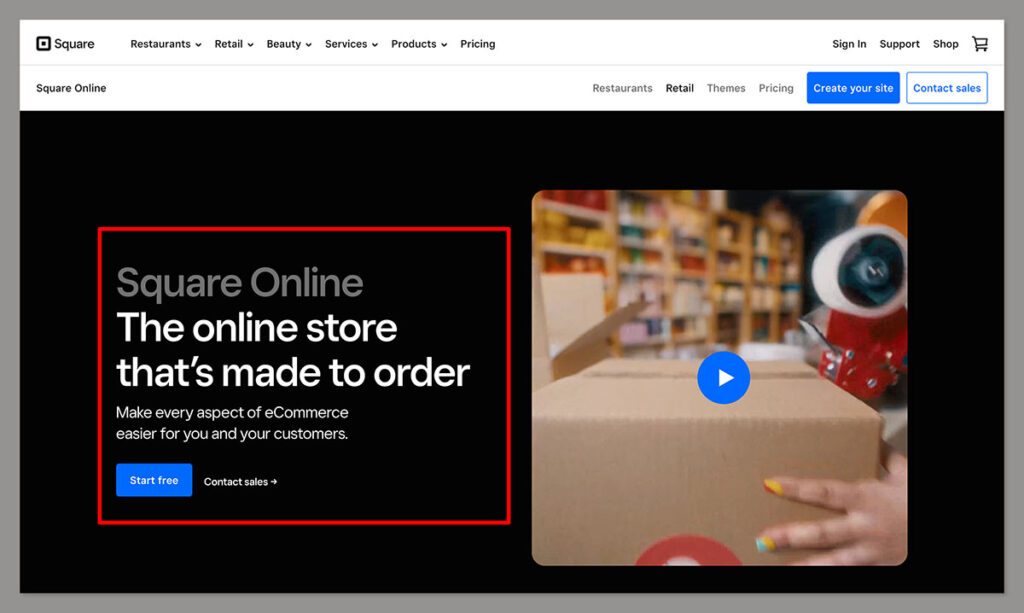
Many online vendors are already familiar with Square as a leading payment processing solution provider. However, the company also has its own website building solution, “Square Online”. This ecommerce business platform is ideal for companies who want to combine online and in-person selling, thanks to its connection to the Square POS.
Square Online offers all the basic functionality companies need to start running an online store, from website templates, to payment processing, and scheduling apps. Though there are fewer customization options for websites than you’d get from other vendors, Square’s ease-of-use combined with its affordability make it a great choice for beginners.
Square Key features:
- Straightforward website building and design tools
- Secure and reliable credit card and payment processing
- Sell online or in-person with inventory syncing
- Integrations with point of sale tools
- Staff management and collaboration tools for teams
- Back-end order and inventory management
- Marketing and SEO tools
Square Dropshipping Integrations
Though Square doesn’t integrate with as many tools as some other ecommerce platforms, it still offers support for options like Spocket, Printful, EasyShip, and ShopFlex.
Pricing:
You can build a Square online store for free and pay only Square’s processing fees on your transactions.
If you want a more advanced plan, options start at $20 per month for access to more themes, site customization options, item settings, PayPal payment processing and subscriptions.
Pros:
- Free plan for beginners
- Excellent online and in-store inventory syncing
- Impressive website themes
- Very easy to use for people without technical knowledge
- Order fulfillment and pickup options
Cons:
- Limited website customization
- Lacking advanced ecommerce features
4. WooCommerce
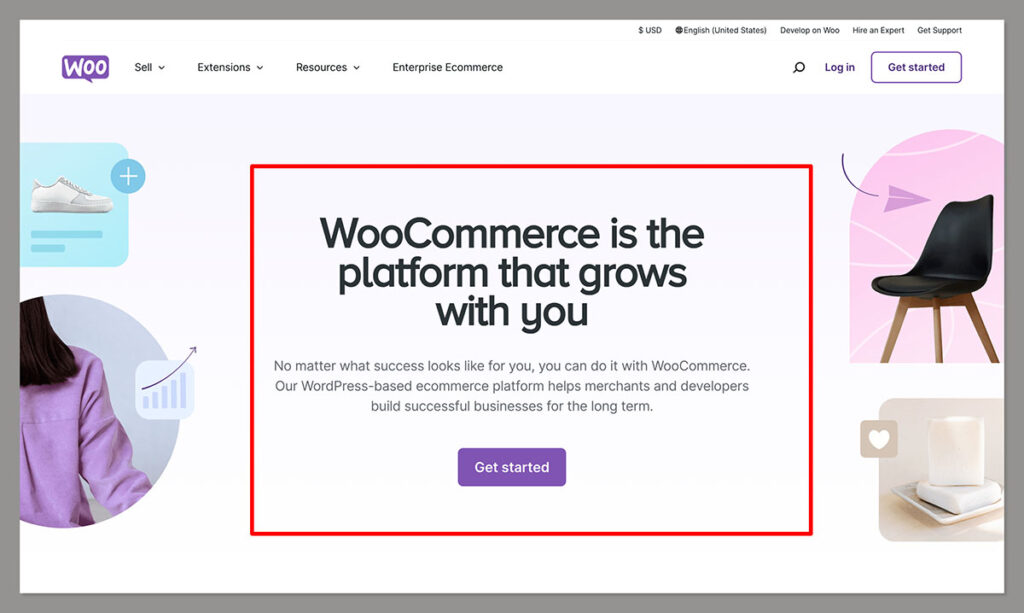
If you’re looking for the best ecommerce platform for dropshipping and you value flexibility, WooCommerce might be the perfect solution. This WordPress plugin allows you to convert your standard website into a comprehensive ecommerce business with minimal effort. It’s one of the most popular ecommerce platforms out there, with 39% of the market share.
WooCommerce is a user-friendly solution, baked into the WordPress environment, which has almost no learning curve to deal with. It supports payment processing for a wide range of credit card, debit card, and mobile wallet payment options. Plus, it offers excellent customization options, through a wide range of apps and plugins in the WordPress app marketplace.
WooCommerce Key features:
- Easy-to-use website builder with WordPress website templates
- Built-in features for payment processing and checkout management
- Mobile app for running your store on the move
- Real-time dashboards and analytics
- Flexible integrations with dozens of other business tools
- Security and privacy features
- Order and inventory management
WooCommerce Dropshipping integrations
As a WordPress plugin, WooCommerce works with most of the add-ons available on the WordPress marketplace. You can connect it with popular options like AliDropship, Spocket, DropshipMe, WooDropship, Dropified, and many others.
Pricing:
WooCommerce is an open-source plugin, so you can access it on your WordPress website for free. However, you’ll still need to pay for your WordPress site, whether that means accessing a hosted plan, or paying for hosting, security, and your domain name yourself. There may also be transaction plans to pay depending on your payment processor.
Pros:
- Extremely easy to use for beginners
- No monthly subscription fees
- Excellent and secure payment processing
- Vast range of customization options
- Great SEO tools (Through WordPress)
Cons:
- Requires you to use WordPress as your CMS
- Some technical knowhow is required for certain features
5. Squarespace
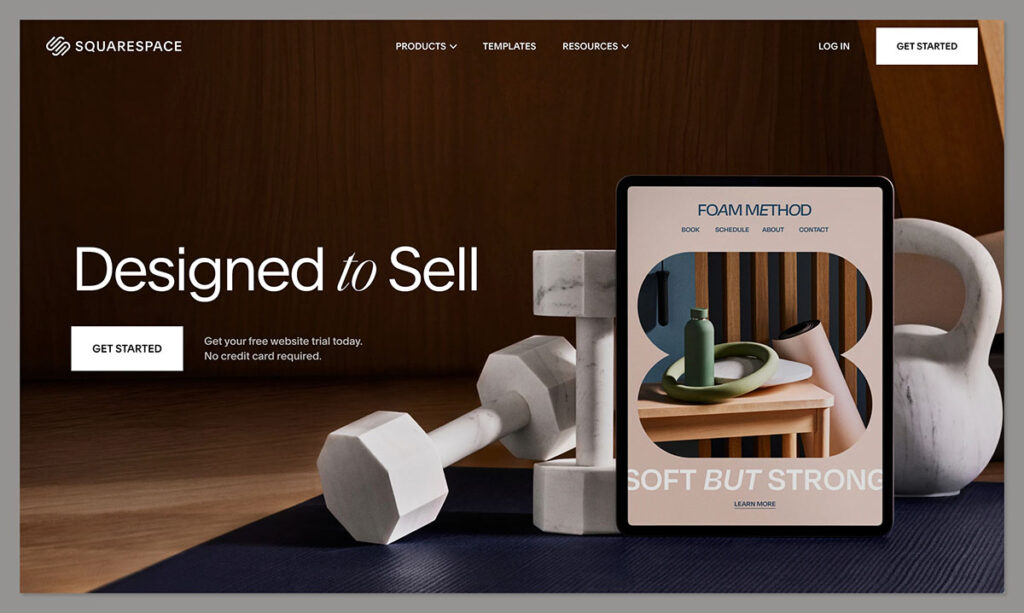
Popular among members of the creator economy, Squarespace is a fantastic website builder with ecommerce functionality built-in. It’s a fantastic platform for making your brand stand out with highly professional and attractive themes. Plus, you can use Squarespace to sell anything, from dropshipping products, to service subscriptions.
Aimed at smaller companies and entrepreneurs, Squarespace is very easy to use, and highly flexible. You can sell through multiple channels with minimal effort, and leverage integrated marketing tools for email, social media, and content production. There’s even an included blog on all sites.
Squarespace Key Features:
- Intuitive website builder with dozens of professional templates
- Fantastic payment processing tools
- Back-end inventory and fulfillment management
- Analytical and reporting tools
- Support for selling several types of products
- Integrated sales and marketing features
Squarespace dropshipping integrations:
Squarespace supports various dropshipping solutions, including Printful and Printify for print on demand, Spocket, SPOD, and Syncee for dropshipping and more.
Pricing:
Although Squarespace offers a range of plans to choose from, you’ll need at least a Business plan, starting at $18 per month to sell products. More advanced ecommerce plans come with no transaction fees, customizable checkouts, and automatic analytics, starting at $27 per month.
Pros:
- Very attractive and professional templates
- Easy setup for beginners
- No transaction fees on most plans
- Excellent ease of use for beginners
- Integrated marketing tools
Cons:
- Access to advanced features can be expensive
- Ecommerce capabilities are limited compared to alternatives
6. Shift4Shop

Focused on smaller businesses, Shift4Shop offers a simple turnkey ecommerce solution, combining a website builder, marketing tools, and features for product and inventory management.
It’s one of the most straightforward options for new online storeowners, giving you all the tools you need to launch your ecommerce site with minimal effort.
There are plenty of templates to choose from, straightforward design tools, and back-end management tools that streamline order fulfillment. Shift4Shop even helps small businesses automate various processes with customizable workflows.
Plus, there are SEO, customer management tools, and payment processing capabilities already built-in.
Shift4Shop Key Features:
- Website builder with hundreds of templates
- Complete suite of marketing and SEO tools
- Inventory and order management
- Integrated checkout with fraud protection
- Large app marketplace
- Automation capabilities
- Omnichannel sales across marketplaces like Ebay and Amazon
Shift4Shop dropshipping integrations:
Shift4Shop can integrate with a wide range of platforms and dropshipping website options through Zapier.
However, it only has a handful of dropshipping apps on its marketplace, including Banggood, Doba, Printful, Brands Gateway, and Order Desk.
Pricing:
Shift4Shop offers an enterprise-grade free plan suitable for dropshipping, although you do need to ensure you’re processing at least $500 in orders per month. Paid plans start at $2339 per month and include PayPal order processing.
Pros:
- Easy to use backend for beginners
- Exceptional free plan for smaller businesses
- Industry-leading AI-driven fraud protection
- Free store migration for new users
- Omnichannel selling options
Cons:
- Fewer apps and integrations than some alternatives
- Limited number of themes.
7. BigCommerce
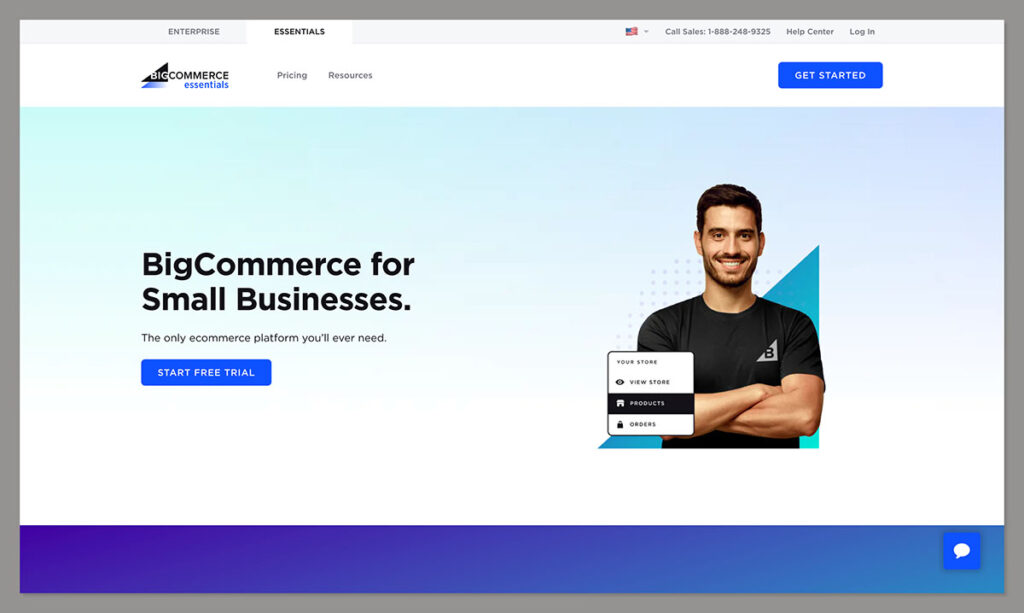
Compatible with some of the best dropshipping platforms around, BigCommerce is an exceptionally scalable ecommerce solution. It’s great for businesses looking to grow, with more built-in features than virtually any other platform.
While the system has a slightly higher learning curve than some of the other options mentioned here, you do benefit from a very flexible platform.
BigCommerce can support headless commerce and omnichannel selling, as well as both online and offline sales tactics. It also comes with most of the tools you need to grow your business included, such as marketing and SEO tools, and inventory management options.
There are even tools to help increase your conversions through upselling and cross-selling.
BigCommerce Key Features:
- Exceptionally scalable website builder with lots of themes
- Omnichannel and international selling
- Open SaaS and API solution for flexibility
- Multi-storefront and wholesale options
- Integrated marketing tools for email and social media
- Support for multiple payment methods
- Search engine optimization
- Abandoned cart recovery and custom checkouts
BigCommerce Dropshipping integrations:
BigCommerce’s flexible API structure means you can connect virtually any form of dropshipping platform or service to your site. The solution is compatible with tools like AutoDS, Modalyst, Spocket, Printful, and many others.
Pricing:
The monthly fee you pay for BigCommerce will depend on your specific business needs. Plans start at around $29 per month, with no transaction fees. However, there are also custom plans available for businesses with enterprise-level needs.
Pros:
- Excellent scalability for larger businesses
- No hassle website builder with integrated marketing tools
- Excellent features for increasing profit margins
- No product limits or transaction fees on any plan
- Powerful reporting and analytics
Cons:
- Sales caps on some pricing plans
- Setting up custom integrations can be complex
8. Sellfy
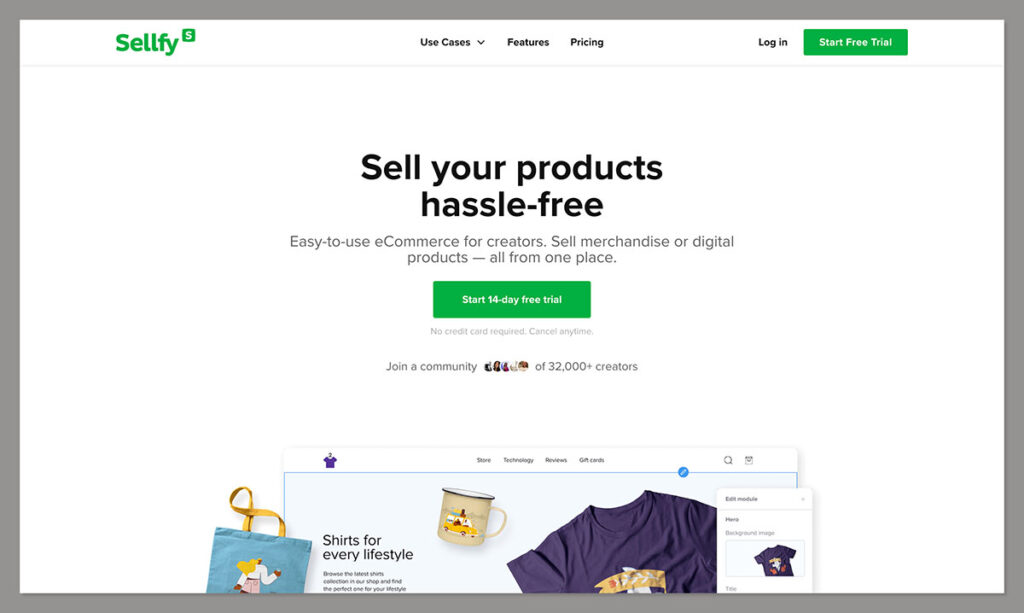
Sellfy is one of the few ecommerce platforms specifically designed to support people in the dropshipping and print on demand landscapes. It’s an ecommerce platform with built-in print on demand options, so you can sell pre-made and custom products simultaneously.
The platform doesn’t charge any transaction fees, and it comes with a host of valuable tools, such as marketing features, options to create custom billing schedules and subscriptions, and payment processing.
You get shopping carts optimized for mobile devices, excellent themes, and access to a range of tutorials to help you grow your business too.
Sellfy key features:
- Straightforward website builder with included shopping cart
- Email marketing and upselling tools
- Omnichannel selling options
- World-class security for payment processing
- Extensive customer support
- Subscription and digital product support
- Print on demand included
Sellfy dropshipping integrations
Sellfy reduces the need to rely on dropshipping apps by building a print on demand solution straight into your ecommerce platform. If you want to connect with other channels and dropshipping vendors, however, you’ll need to use Zapier hooks.
Pricing:
Sellfy plans start at $19 per month, which allow you to sell unlimited products and make up to $10k a year.
You also get to connect your own domain and access email marketing tools. However, if you want to remove Sellfy branding from your store, you’ll need to pay $49 per month for the Business plan.
Pros:
- Built-in print on demand
- Wide range of selling options
- Included email marketing and social media
- Excellent payment processing
- High level security and privacy
Cons:
- Fewer customization options than some alternatives
- Limited one-click integrations
The Best Ecommerce Dropshipping Platforms
If you’re ready to start your own dropshipping venture, there are plenty of excellent ecommerce platforms out there ready to support you.
Whether you’re looking for an all-in-one scalable platform like BigCommerce, or a highly flexible and user-friendly tool like Shopify, you should have no problem bringing your new business to life.
If you need more tips on which ecommerce platforms to use, how to grow your dropshipping business, or which dropshipping apps to use to find trending products, check out our other reviews, guides, and articles on SourceLow.com.
FAQ
Which is the best platform for dropshipping?
The best ecommerce platform for dropshipping in our opinion is Shopify. It’s a highly flexible and easy to use platform. Plus, the Shopify app marketplace comes with dozens of dropshipping and print on demand tools to choose from.
Is dropshipping on Shopify worth it?
Absolutely, with the right business plan, and a carefully chosen selection of products, you can build a highly profitable business on Shopify. You’ll have no problem finding vendors with Shopify’s app marketplace, and the ecommerce platform makes it easy to manage all aspects of your business.
Can you still get rich from dropshipping?
Yes, but only if you have the right strategy. You’ll need to ensure you’re choosing the right products from reputable vendors, based on market demand. It’s also important to build an impressive store, dedicate the right amount of time to marketing, and deliver excellent customer service.
